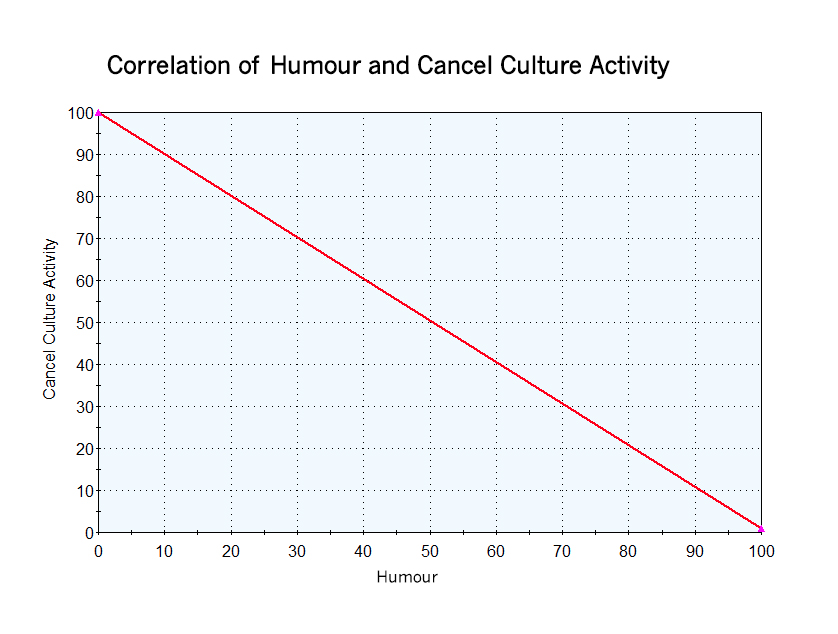

AtomTM_Social_Studies_Group [ASSG]
01.03.2024
On the Correlation of Humour and Cancel Culture Activity
This empirical study took place in the period of 1968 until the present day and consists in the direct monitoring and evaluation of the two main components:
- The direct and active engagement of a person in Cancel Culture activities, measured both, in time and amount of words.
- The appearance and quality of humour of the same person, measured as wit, respectively as the absence of such.
The study has shown that both components are directly correlated in a linear manner. There is an indication of a link between the age of the observed subjects in relation to the main components, yet this correlation has not been sufficiently studied in order to be able to present a valid, fully formed analysis. [results pending]. However, the ASSG willingly succumbs to the commonly accepted assertion, that facts and data ain’t no proof for nothing.

A byproduct of the study also shows that repeating a joke, every now and then, may yield positive results.
When defining “Cancel Culture activity” the standard definition has been used, stating that throughout any gender or age group, the execution of bullying and blackmailing through the various means of digital communication networks can be seen as the standard or mainstream behavior. It can also be stated that Cancel Culture is mainly a so-called “Western” phenomenon, which has been functioning as a hegemonial control mechanism, led by a group of oligarchs through their “social” media networks. The AASG clearly states being an outside observer to said culture.
When defining “humour” some may say that it is the cousin of critique, while others believe that said cousin is a patriarchal concept of oppression.
The study group predicts a further increase in Cancel Culture activities and therefore a continuing decline in humour and humour-related expressions throughout the cultural network, even though there are strong indicators of social hyper-saturation, which will make Cancel Culture a reactionary, if not laughable, episode in the very near future.
This investigation is part of the wider Study on the Phenomenology of Social Decay, the Study of Irrationality in the Collective West and the Study of Social Religions and Wit. Its data will also feed into other ongoing investigations on topics such as criminal behavior on oligarchical, privately owned social networks, Intelligence shaming, system analysis of neo- and meta-authoritarian societies and, above all, one-liners.
3 Responses to “Entry #21 – On the Correlation of Humour and Cancel Culture Activity”
“Comedy should provoke! It should blast through prejudices, challenge preconceptions! Comedy should always leave you different than when it found you.” – Duckman, 1994.
There’s no comedy without victims. Laughter is always aimed at/because of someone or something else (even in the ‘laughing with rather than at’ cases), but the difference lies on what direction one aims the mockery to, what preconception one’s aiming to challenge to begin with. All comedy means to ridiculize, by definition. To harm if pushed too far, even.
In the end cancel culture is society trying to deem which comedy is fair, as in, directed towards the ‘right’ target, and which comedy isnt: but that would imply there’s ideas that are NOT to be questioned, which, in the end, cant be anything but dangerous. Hate speech we don’t need, we don’t want it. But laughter is very much needed. To hate is to destroy, to laugh is to question: two vastly different exercises.
More than agreed! I have never come across a comedian or anyone satirical whose motivation was hate. Even more so, laughing about a topic or about humans embodying it may be a necessity to avoid the path of hate. I also believe that humour has many more facets, such as being a mirror to society or to oneself. Furthermore, within humour exists the intention to express the unspeakable, the hidden, inconvenient truths that often are in everybody’s minds. I find it surprising and incomprehensible how much aggression humour can trigger, which reveals a lot about the current situation and its protagonists – “The tyrant’s lack of humor” is something I read the other day somewhere.
P.S.: an interesting add-on regarding “hate speech” (more details perhaps here on the blog at some point): I have found it very revealing how easily people can be called names on social media, of which my favourite is “nazi”, as a hate word for literally anybody who has an non-conformist opinion theses days. Strangely, for a world which supposedly is being so sensitive to other words, nobody, not even the very same social media platforms, seem to take that kind of insult seriously, while for other words one can easily get banned. I sense a severe disproportion here and would love to see “hate speech” eradicated equally. It is also rather interesting to receive quite a bit of hate in response of clearly ridiculous and silly artistic expression, which also seems to be no biggy, it seems.